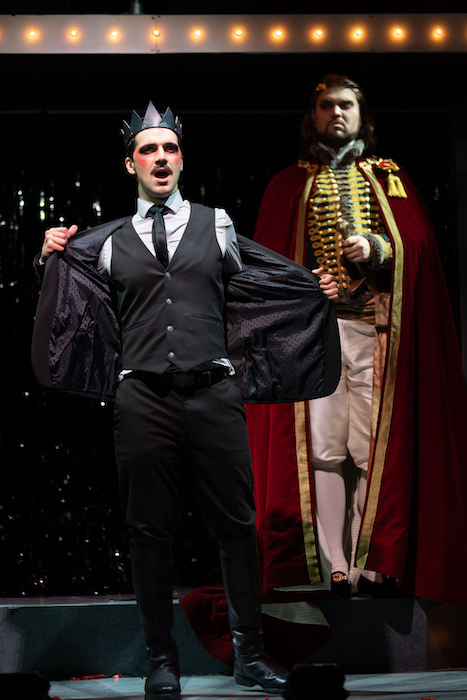Satiric worlds collide in Wolf Trap Opera’s upended double bill

Ben Edquist and Anthony Robin Schneider in Viktor Ullmann’s “The Emperor of Atlantis” at Wolf Trap Opera. Photo: Scott Suchman
Wolf Trap Opera offered two wryly satriric views of worlds turned upside down Saturday night. While Christoph Willibald Gluck’s Merlin’s Island (L’île de Merlin, ou Le monde renversé) and Viktor Ullmann’s The Emperor of Atlantis (Der Kaiser von Atlantis) share a somewhat common theme, though the way each composer treats it could not have been more different.
Watching the performance of Ullmann’s Emperor at the Barns of Wolf Trap, it was hard to separate the work itself from the circumstances of its creation.
Composed in the Nazis’ so-called “model ghetto” of Theresienstadt in 1943, the one-act work, with a libretto by Peter Kien, is a thinly concealed criticism of Adolf Hitler and fascism’s disregard for the value of human life. SS officials visited rehearsals at Theresienstadt in 1944, grasped the opera’s underlying messages and cancelled the production before it reached the camp’s stage. Ullmann and Kien were sent to Auschwitz, where both men were killed.
Fortunately, a copy of the opera’s score survived. Thirty-two years after it was composed, the opera debuted in the Netherlands in 1975. Emphasizing the opera’s emotional power and creativity, Wolf Trap Opera’s fine performance allowed the work to transcend the tragic history surrounding its creation.
Scored for a small orchestra, including saxophone, harmonium and banjo, Ullmann’s composition owes much to Mahler, Hindemith and Weill. Accordingly, the score is a heavy challenge for singers, with many wide jumps in range.
The story opens with a Loudspeaker introducing the players, including Harlekin, Death, the Emperor, a Drummer and two soldiers, one male, the other female. The world’s natural order has been upset, Harlekin (an outstanding Joshua Blue) sings, laughing in spite of his tears.
Emperor Overall has declared a great war with no survivors. Protesting the Emperor’s declaration—committing men to die is his mission, not the Emperor’s—Death (an equally outstanding Anthony Robin Schneider) goes on strike; as a result, nobody is dying. The Emperor is incensed. Instead of fighting, the two soldiers dance. Despite full-throated encouragement to fight from the Drummer (Megan Esther Grey), the soldiers fall in love.
In the end, the Emperor, in a performance by Ben Edquist that combined satire and seriousness, relents; he agrees to let Death restore order and volunteers to be the first to die. The opera ends with a quartet singing, “Come, Death, our honored guest…Lift life’s burdens from us.”

Gluck’s “Merlin’s Island” was presented at Wolf Trap Opera. Photo: Scott Suchman
Like the Ullmann opera, Gluck’s Merlin’s Island is a social and political commentary, though it uses riotous comedy in this staging to make its points. Wolf Trap Opera’s appropriate light touch with this opéra comique resulted in an entertaining experience.
Gluck makes Merlin’s desert island nearly immense joy. Shipwrecked sailors Pierrot and Scapin lament the food and drink of Paris. Instantly a huge turkey and bottles of the finest red wines appear. They again try their luck, requesting female companions; Merlin’s pretty nieces Argentine (Niru Liu) and Diamantine (Shannon Jennings) arrive.
The sailors (the appropriately campy Ben Edquist and Daniel Noyola) admit to the women that they are penniless. At this point they learn that all things on the island are upside down. Wealth is frowned upon as excessive, the women tell them in a duet that was meltingly beautiful as Liu and Jennings matched their phrases perfectly.
After that the sailors learn all the island’s businessmen are honest, its lawyers kind and charitable. Lovers never quarrel or cheat on their mates, they only support them. When islanders are ill, the doctor (Megan Esther Grey, again projecting with a powerful yet stylish mezzo) merely touches under their chin, and they recover instantly.
Though nowhere near as challenging a vocal assignment as the Ullmann work, Merlin’s Island affords many opportunities for its singers to shine. Conor McDonald’s Merlin was downright hilarious, complete with a purposefully bad Canadian accent. Energetic conductor Geoffrey McDonald led the productions with stylish tempi and never overpowered the singers.
The double bill will be repeated 7:30 p.m. Wednesday and Friday, and 3 p.m. June 30. wolftrap.org; 703-255-1954
